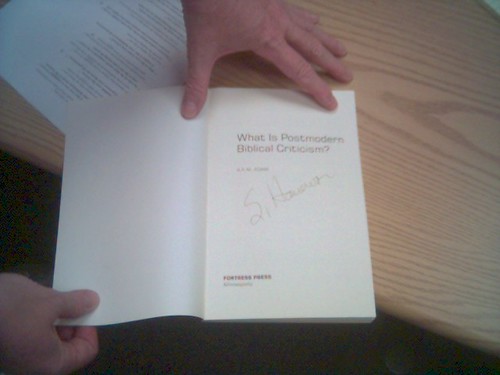Pushover
I often harrumph about not participating in the quiz-game-thingummybobs that propagate on the Web — you know, “Where was your first kiss?” “What’s your favorite Perry Como single?” and “If you could be a species of grapevine, which would you be?”
I nonetheless participate from time to time, either because it seems to involve actually important information (quizzes involving music, for instance) or because the fancy strikes me, or because a personal or political link to the person who tagged me outweighs my general antipathy to quizzes.
So when I noted that Beth had tagged me for a “Five Things Feminism Has Done For Me” quiz, I winced a little. There’s a worthwhile political impulse involved, and Beth’s a terrific student assistant, wonderful friend to Pippa and Si, and all-around commendable person, and it was her birthday Friday. Still, I might have resisted answering, since her post itself provided the escape clause “(who I don’t expect will actually take it up, but whose response I’d love to hear).” But out of idle curiosity, I clicked around to see what her other correspondents said — and not one of them had taken up the challenge. “What Feminism Has Done For Me” seems worth at least one response, so I’ll take it up (and see if that motivates the other slackers to get going).
First, I’d say that feminism has played instrumental role in making the world a more humane place by bringing to explicit awareness the extent to which social systems tend to produce and exploit categories of less-privileged people who contribute much more labor, commitment, and vital energy than the society itself recognizes — so that more-privileged categories can enjoy the benefits of exploitation. The exploited need not be women (we could fill in the blank with “untouchables,” illegal immigrants, of course African Americans, or children). Still, since so many societies cast women into that category, and women constitute a part of every society, feminism calls to our attention to men’s exploitation of women as a paradigmatic case of this phenomenon.
Second, I’d cite the impetus that feminist scholars gave to the critical study of ways that language and social organization affect one another. In most cases, you can call me a traditionalist and I’ll be proud of the epithet, but I thank feminist social critics for teaching me to be more careful about how I use pronouns such as “he.”
Third, feminism has raised to prominence a bracing array of vigorous, challenging, sharp-witted and sharp-tongued and sharp-penned writers, speakers, personalities. Luce Irigaray (my favorite), Julia Kristeva, Elisabeth Schüssler Fiorenza, bell hooks, Judith Butler (despite her writing style), Gayatri Chakravorty Spivak, Sarah Coakley, A.-J. Levine, Mary McClintock Fulkerson, and Mary Daly: I don’t by any means always agree with them, but their participation enriches our discourses immensely (and if our society were so organized as to stifle their participation, that silence itself would shout aloud a damning indictment).
Fourth, the prominence of such figures as I named above brings about great good for us all, by encouraging women to write out loud, by opening doors for further women to rush in through, by showing subsequent generations of women what it might look like for women to occupy a stage set by and for men, without accepting men’s terms for how and why they might be there. Because they’ve gone first, Pippa may have a surer sense of where she wants to go, and why, and how it may differ from the courses they took.
Fifth, feminist critics (along with critical scholars of race) stand to remind me (and most of us) how very eager we are to let ourselves off the hook for the persistence of sexism and racism. When I wrote about “White Guy Theology, the emphasis should have fallen as heavily on the “guy” part as on the “White” part — though if readers felt the impact of the latter more than the former, it may be a reminder of how urgently we need to keep listening to feminists.
I wince when people use the term “post-feminist”; even people who dissent from the arguments that characterize feminist criticism benefit from thoughtful engagement with feminism. Hard as I might try, I do not envision a day when any culture with which I’m acquainted will be able to dispense with its feminist challengers.
